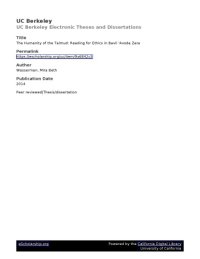
Ebook: The Humanity of the Talmud: Reading for Ethics in Bavli ʿAvoda Zara
Author: Mira Beth Wasserman
- Year: 2014
- Publisher: University of California
- City: Berkeley
- Language: English
- pdf
In this dissertation, I argue that there is an ethical dimension to the Babylonian Talmud, and that literary analysis is the approach best suited to uncover it. Paying special attention to the discursive forms of the Talmud, I show how juxtapositions of narrative and legal dialectics cooperate in generating the Talmud's distinctive ethics, which I characterize as an attentiveness to the “exceptional particulars” of life.
To demonstrate the features and rewards of a literary approach, I offer a sustained reading of a single tractate from the Babylonian Talmud, ʿAvoda Zara (AZ). AZ and other talmudic discussions about non-Jews offer a rich resource for considerations of ethics because they are centrally concerned with constituting social relationships and with examining aspects of human experience that exceed the domain of Jewish law. AZ investigates what distinguishes Jews from non-Jews, what Jews and non- Jews share in common, and what it means to be a human being.
I read AZ as a cohesive literary work unified by the overarching project of examining the place of humanity in the cosmos. The talmudic materials are organized as a journey down the cosmic chain of being, from the supernal realm of souls and spirit, to the material world of embodied, animal existence, to the inanimate domain of physical objects. In tracing this descent, I discover in AZ the outlines of a rabbinic anthropology that affirms the common humanity of Jews and non-Jews, and highlights the role of Jewish law in constituting Jewish difference.
As I make my way through AZ, I bring the talmudic text into dialogue with critical insights and issues from philosophy and literary theory. Pointing to ways that the editors of AZ engage the philosophic currents of their time, I challenge the prevailing characterization of the Bavli editors as inwardly focused. Even more important, I explore how AZ engages the critical questions of our time-- questions of identity and alterity, of universalism and particularism, of justice and community.
To demonstrate the features and rewards of a literary approach, I offer a sustained reading of a single tractate from the Babylonian Talmud, ʿAvoda Zara (AZ). AZ and other talmudic discussions about non-Jews offer a rich resource for considerations of ethics because they are centrally concerned with constituting social relationships and with examining aspects of human experience that exceed the domain of Jewish law. AZ investigates what distinguishes Jews from non-Jews, what Jews and non- Jews share in common, and what it means to be a human being.
I read AZ as a cohesive literary work unified by the overarching project of examining the place of humanity in the cosmos. The talmudic materials are organized as a journey down the cosmic chain of being, from the supernal realm of souls and spirit, to the material world of embodied, animal existence, to the inanimate domain of physical objects. In tracing this descent, I discover in AZ the outlines of a rabbinic anthropology that affirms the common humanity of Jews and non-Jews, and highlights the role of Jewish law in constituting Jewish difference.
As I make my way through AZ, I bring the talmudic text into dialogue with critical insights and issues from philosophy and literary theory. Pointing to ways that the editors of AZ engage the philosophic currents of their time, I challenge the prevailing characterization of the Bavli editors as inwardly focused. Even more important, I explore how AZ engages the critical questions of our time-- questions of identity and alterity, of universalism and particularism, of justice and community.
Download the book The Humanity of the Talmud: Reading for Ethics in Bavli ʿAvoda Zara for free or read online
Continue reading on any device:

Last viewed books
Related books
{related-news}
Comments (0)